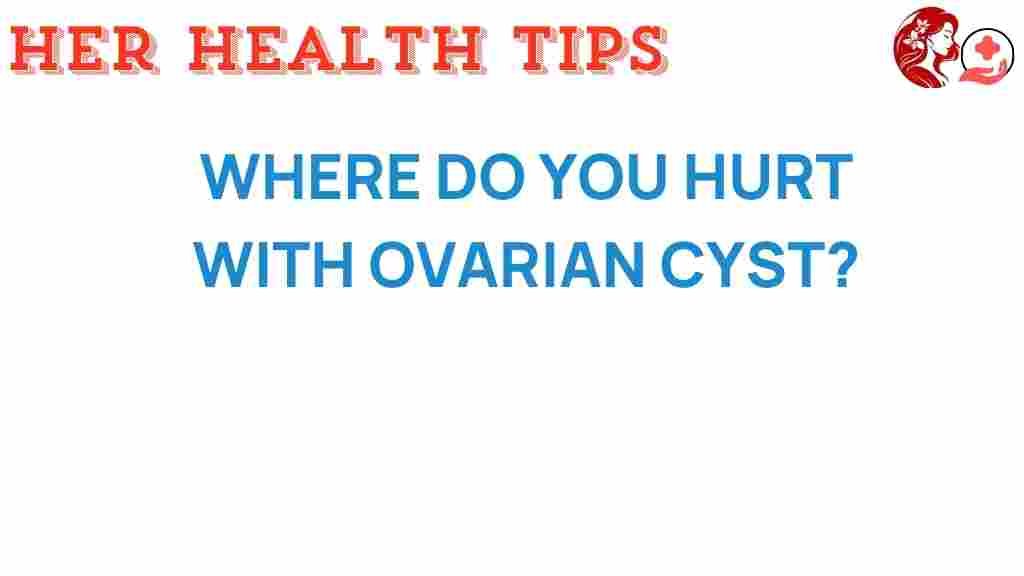Ovarian Cysts: Symptoms, Diagnosis, and Treatment
Ovarian cysts are fluid-filled sacs that can develop on the ovaries, and they are a common occurrence in women of reproductive age. While many ovarian cysts are harmless and resolve on their own, understanding the symptoms, diagnosis, and treatment options is crucial for managing women’s health effectively. In this article, we will delve into the intricacies of ovarian cysts, their symptoms, pain management strategies, and the importance of proper healthcare education in reproductive health.
What Are Ovarian Cysts?
Ovarian cysts are a type of benign tumor that forms on or inside the ovaries. They can vary in size, from tiny to large, and most women will experience an ovarian cyst at some point in their lives. While they are generally harmless, some cysts can cause pain and discomfort.
Symptoms of Ovarian Cysts
Many ovarian cysts do not produce any noticeable symptoms, but when symptoms occur, they can include:
- Pain in the lower abdomen: This can be a dull ache or sharp pain, often on one side.
- Pelvic pressure or discomfort: This sensation may occur during physical activities or sexual intercourse.
- Changes in menstrual cycle: Irregular periods or changes in flow may indicate the presence of a cyst.
- Difficulty emptying the bladder: Large cysts can press against the bladder, leading to frequent urination.
- Breast tenderness: Hormonal changes associated with cysts can lead to breast sensitivity.
If you experience severe pain, sudden onset of pelvic pain, or other severe symptoms, it is essential to seek medical attention immediately, as these could indicate complications such as cyst rupture or ovarian torsion.
Diagnosing Ovarian Cysts
Proper diagnosis of ovarian cysts is critical for effective management. The diagnostic process typically involves:
- Medical History Review: Your healthcare provider will ask about your symptoms, menstrual cycle, and family history.
- Physical Examination: A pelvic exam may help the doctor feel for any abnormalities.
- Ultrasound: This imaging test is the most common way to visualize ovarian cysts and assess their size and type.
- Blood Tests: Hormone levels may be evaluated to check for conditions like polycystic ovary syndrome (PCOS).
Early diagnosis is vital in managing ovarian cysts effectively and can help prevent complications that may affect reproductive health.
Managing Pain from Ovarian Cysts
Managing pain associated with ovarian cysts can be approached through various methods:
- Over-the-Counter Pain Relief: Non-steroidal anti-inflammatory drugs (NSAIDs) such as ibuprofen can help alleviate mild to moderate pain.
- Heat Therapy: Applying a heating pad to the lower abdomen can relax muscles and provide relief.
- Prescription Medications: In cases of severe pain, a doctor may prescribe stronger pain medications.
- Hormonal Birth Control: Birth control pills can help regulate the menstrual cycle, reducing the formation of new cysts and associated pain.
It’s essential to consult your healthcare provider before starting any pain management regimen, especially if you have underlying health conditions or are taking other medications.
Treatment Options for Ovarian Cysts
While many ovarian cysts resolve without intervention, some cases may require treatment. Options include:
- Watchful Waiting: If the cyst is small and asymptomatic, your doctor may recommend regular monitoring without immediate treatment.
- Medication: Hormonal treatments can be effective in managing symptoms and preventing new cysts from forming.
- Surgery: In cases where cysts are large, persistent, or cause significant pain, surgical options may be necessary. This can include laparoscopic surgery or, in rare cases, a more invasive surgical procedure.
It’s crucial to discuss all treatment options with your healthcare provider to determine the best course of action based on your specific situation.
Reproductive Health and Ovarian Cysts
Understanding ovarian cysts and their implications is essential for maintaining reproductive health. Here are some key points to consider:
- Regular Check-ups: Routine gynecological exams can help detect ovarian cysts early, ensuring timely intervention.
- Education and Awareness: Women should be educated about their bodies and the signs of ovarian cysts to advocate for their health effectively.
- Support Networks: Engaging with support groups or communities can provide emotional support and valuable information for women dealing with ovarian cysts.
Awareness and education about ovarian cysts are vital for empowering women to take charge of their reproductive health.
Healthcare Education and Ovarian Cysts
Healthcare education plays a significant role in managing ovarian cysts and understanding women’s health. Here are a few educational resources:
- The American College of Obstetricians and Gynecologists: This organization provides comprehensive information on women’s health and reproductive issues.
- Office on Women’s Health: A government resource for women’s health issues, including ovarian cysts.
By utilizing these resources, women can gain a better understanding of ovarian cysts, their symptoms, and the importance of seeking medical advice.
Troubleshooting Tips for Managing Ovarian Cysts
If you are dealing with ovarian cysts, consider these troubleshooting tips:
- Track Your Symptoms: Keeping a journal of your symptoms can help you identify patterns and discuss them with your healthcare provider.
- Maintain a Healthy Lifestyle: Regular exercise, a balanced diet, and stress management can improve overall reproductive health.
- Seek Early Medical Advice: Don’t hesitate to reach out to a healthcare professional if you notice any concerning symptoms.
By being proactive, you can better manage the challenges that come with ovarian cysts.
Conclusion
Ovarian cysts are a common aspect of women’s health that can cause significant discomfort and anxiety. Understanding the symptoms, diagnosis, and treatment options is essential for effective pain management and maintaining reproductive health. With the right education and support, women can navigate the complexities of ovarian cysts confidently. Remember, if you experience any concerning symptoms, it’s vital to consult with a healthcare provider for personalized advice and treatment.
For more detailed information on women’s health, consider visiting women’s health resources to stay informed and empowered.
This article is in the category Reproductive and created by HerHealthTips Team
